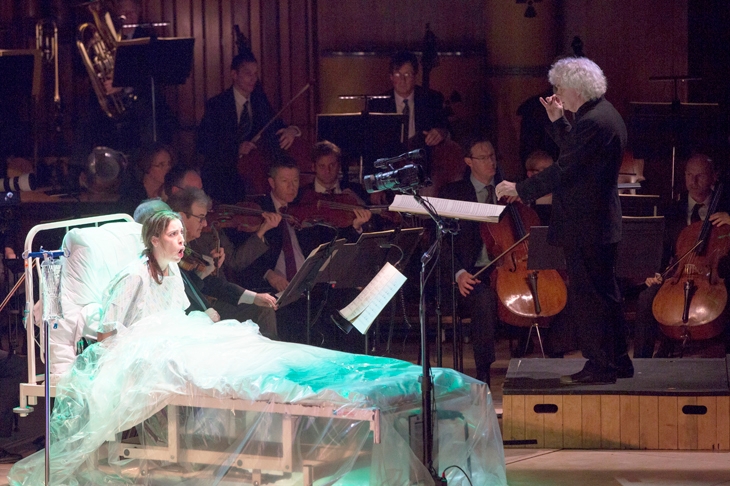For much of the past half-century, London has been the world’s orchestral capital. Not always in quality, but numerically without rival. Five full symphony orchestras and twice as many pint-sized ones kept up a constant clamour for attention. Each month brought new recordings with premier artists. Every orchestra had its own ethos, history and thumbprint. The Philharmonia was moulded by Karajan and Klemperer, the London Philharmonic by Boult and Tennstedt, the Royal Philharmonic by Beecham, the BBC by Boulez and the London Symphony Orchestra by its high spirits. Tales abound of maestros departing with a punch on the nose and beer bottles rolling in rehearsal.
All of which added greatly to the sum of human happiness. London musicians, always cheap, learned to be quick. They became the best sight-readers on earth, able to soundtrack a Hollywood film in six hours flat. Abbey Road, round the corner from where I live, had an orchestral pantechnicon out front seven days a week. Record royalties enabled orchestras to be daring. I once shocked a future head of the Salzburg Festival, telling him that London was putting on simultaneous cycles of Schoenberg and Shostakovich. ‘That could never happen here,’ he sighed, enviously.
There was a buzz around our concert halls. Principal players turned down fat orchestra jobs in Germany, half the work for twice the pay, because London was too exciting to leave. Every hot conductor came to be tested in the London furnace. Competition sizzled between the bands.
And then it died. The record industry faded out first, at the start of this decade, crushed by self-repetition and YouTube. Film work migrated to Prague. Newspapers shrank concert reviews. The BBC dumbed down. Orchestras began playing safe. The capital is in danger of turning provincial.
Big batons stopped coming, except on whistlestop tours with their own ensembles. When the Proms last year were offered Kirill Petrenko, Simon Rattle’s dazzling successor at the Berlin Philharmonic, the BBC declined because they hadn’t heard of him. Strapped for cash, London is losing the plot. Two of its music directors live in Berlin, a third in Los Angeles. Easy to see why: that’s where the action is.
The Barbican and South Bank are playing at 20 per cent and more below capacity for classical concerts. The energy one feels at Vienna’s Musikvereinssaal or the Paris Philharmonie before the start of a concert is made impossible in London by empty seats and nodding, grey heads. The public-funded arts centres seem to be ashamed of classical music. On the South Bank’s website, music is pushed to the margins, somewhere below restaurants.
Among all the factors at fault for this fall, public funding bears the heaviest responsibility. The Arts Council used to dish out its dosh two weeks before Christmas, adding a frisson of anxiety to the scene as one orchestra rejoiced while three others whined. Now, in pursuit of deadly efficiency, orchestras are corralled into a ‘National Portfolio’ and funded triennially. Worse, the new rules dictate that all orchestras shall have prizes, regardless of merit.
The LPO and Philharmonia each receive £2,042,222 a year, on the assumption that they are exactly as good as one another and subject to no ups and downs. The LSO gets a tiny bit more — £ 2,206,050 — to reflect a couple of extra of concerts while the poor old RPO, long out of the loop, is down to £946,394, much of it earned on educational junkets to deprived parts of the country. The RPO was last heard of making a cover album of 1970s punk songs.
The inertia of state funding, allied to the lack of imagination of arts centres, has sapped the fizz from London’s halls, like champagne bottles left uncorked for too long. Where once we were cocks of the concert walk, audiences in Munich and Milan cannot tell one London orchestra from the next. That’s how low we have sunk in five short years.
So what’s to be done? A half-billion-pound new hall and a mop of Rattle hair will not bring back the buzz. What’s needed is new thinking. Orchestras must start thinking for themselves again, not as part of some National Portfolio. They need to get competitive — about what they play, where they play and what they charge. In Glasgow, the Scottish Chamber Orchestra is letting in under-18s for free next year. In Manchester, the Hallé is experimenting with robots in partnership with Siemens. In Liverpool, the music director goes to home matches at Anfield and writes a column in the programme. In Birmingham, the players picked a music director who was under 30 (not to mention female and brilliant). And in London it’s same-old, same-old, same-old. Time to change the music, along with some of the executive directors. And no time to lose.






Comments